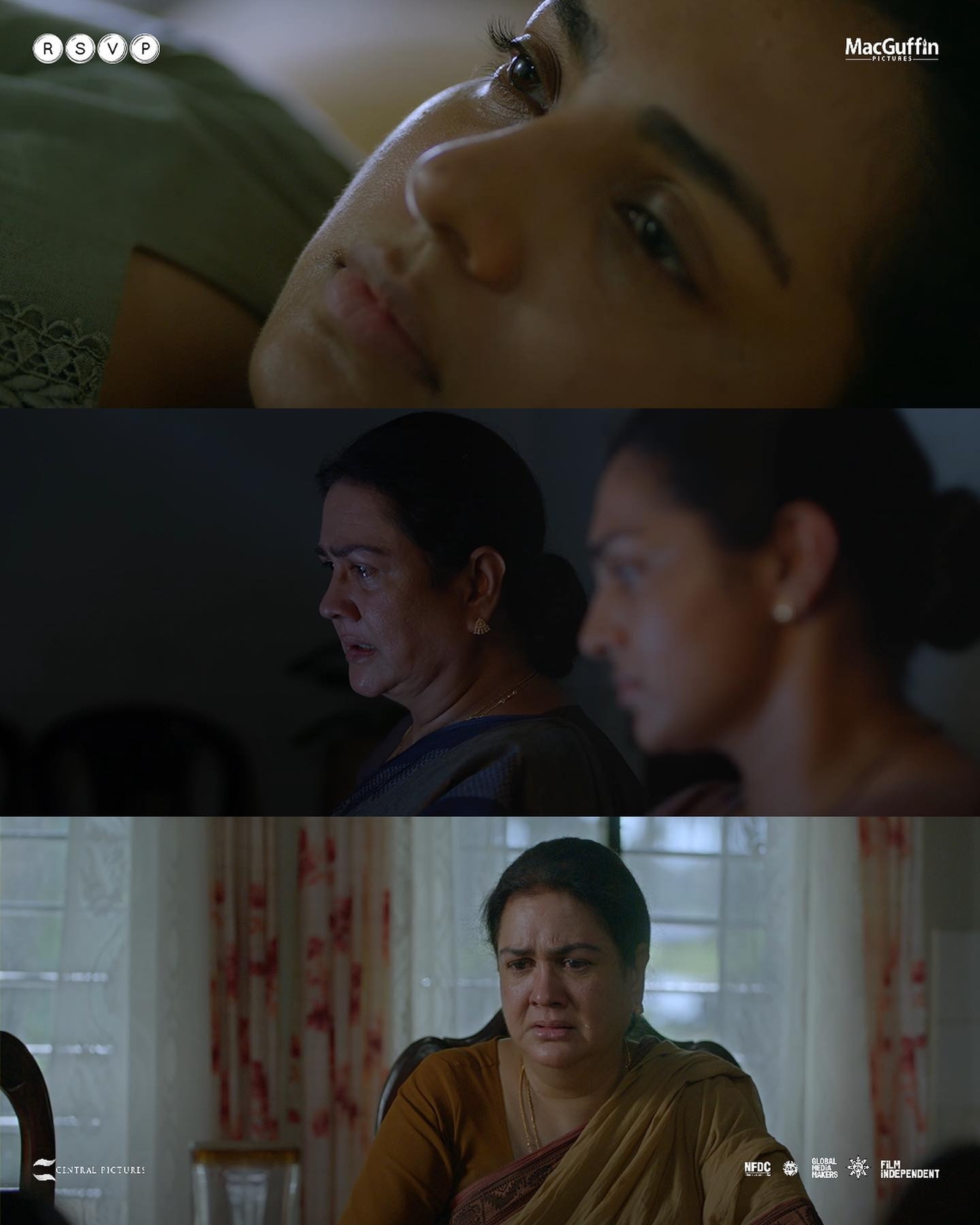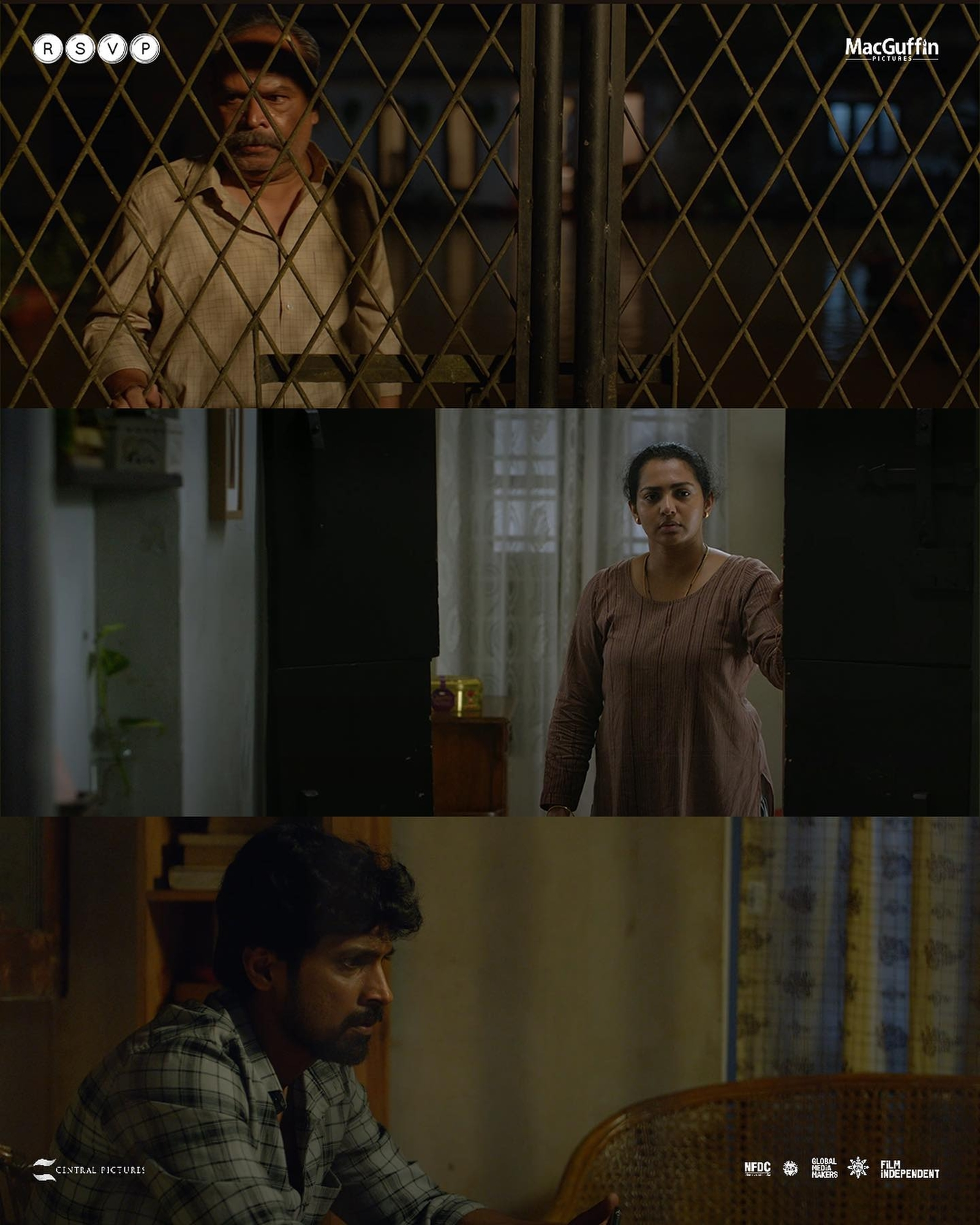In one of his finest films to date Ee Ma Yau (2018), director Lijo Jose Pellissery masterfully created an atmosphere that evoked a constant sense of suffocation, reflecting the emotions of the central character Eeshi (Chemban Vinod Jose). Lijo achieved this by cramming the small house, adjacent lanes, and surroundings with crowds, gathered to “pay their last respects” to Eeshi’s father Vavachan Mesthiri (Kainakary Thankaraj). Similarly, in his debut feature film Ullozhukku (Undercurrent), which too has a corpse at its centre, director Christo Tomy succeeds in creating a similar atmosphere, albeit in a different manner. By judiciously and extensively using close-ups and mid-shots, Christo and cinematographer Shehnad Jalal skillfully highlight the mounting tension in the narrative where “lies drown and secrets surface,” ensuring the audience also feels the weight on the characters’ chests.
Despite its minor shortcomings, Ullozhukku is one of the best Malayalam films of this year. True to its title, the film explores, and at times exposes, the undercurrents of many things, including (the hollowness of) the familial system — which, particularly in the Indian context, is deeply rooted in patriarchy — social conditioning that enforces conformity, parenting, women’s agency, morality, and more.
Ullozhukku revolves around two women — Leelamma (Urvashi) and her daughter-in-law Anju (Parvathy Thiruvothu) — whose lives go through a stormy passage following the death of Anju’s husband and Leelamma’s son Thomaskutty (Prashanth Murali).
Not often do we see Anju sporting a smile. In the opening scene, when she converses with her boyfriend Rajeev (Arjun Radhakrishnan), happily, her eyes sparkling with dreams of their possible future together, she smiles. In the next scene, after her marriage with Thomaskutty, she merely puts on a happy face for the photographs. After that, her smiles become rare. Hailing from a financially struggling household with conservative parents, Anju was compelled to marry Thomaskutty because he belonged to a “blue-blooded” and well-off family, which her parents believed would provide her, and consequently them, with a better life. Once she moves into Thomaskutty’s house, which is also owned and occupied by Leelamma, Anju, like many in her socio-economic situation, resigns herself to the harsh reality that this is her new “life,” from which escape seems impossible.
 Actors Parvathy Thiruvothu and Urvashi in director Christo Tomy’s Ullozhukku. (Image: RSVP/Facebook)
Actors Parvathy Thiruvothu and Urvashi in director Christo Tomy’s Ullozhukku. (Image: RSVP/Facebook)
But, on the nuptial night itself, she realises that expecting “love, compassion, and care” from this relationship is futile, as Thomaskutty, evidently sexually repressed, forces himself on Anju without any regard for her consent. Christo deserves credit for delivering one of the most impactful and brilliant title reveals in recent Malayalam cinema; the movie’s name appears as Anju reflects on the gravity of what she has lost and what she is left with, while the camera soaks up her undercurrents.

One of the greatest strengths of Ullozhukku is that it isn’t loud, melodramatic, or preachy. While it is evident that Christo, who also penned the script, put considerable thought into every moment, dialogue, and setting, he ensured that the narrative’s flow is pristine and genuine. However, while the flow is clear, the story is as murky as the floodwaters inundating the terrain of Kuttanad, where their house is located.
Watch Ullozhukku trailer here:
With Thomaskutty diagnosed with a brain tumour and his health rapidly deteriorating, for the women, each other becomes the sole solace, though they have their own secrets. Despite not receiving even a single drop of love from him, Anju attends to his needs as he becomes increasingly unable to care for himself. Ullozhukku sharply underscores Anju’s willingness to help him simply because he is a fellow human being, while also emphasising her lack of compassion for him in tandem, mirroring the love she never received. You reap what you sow, right?

As her life reaches a dead end, with her routine consisting of shuttling between the hospital and home, she coincidentally meets Rajeev again and eventually turns to him for emotional support and physical needs. In bed with Rajeev, at his home where she went under the pretence of buying medicines, a smile reappears on Anju’s face as the spectre of her old dreams slowly resurfaces. Remember that scene in Chathikkatha Chanthu (2004), where writer Chanthu (Jayasurya) narrates a story to director Harikrishnan (Lal) about a woman who elopes with her boyfriend, leaving behind her bedridden husband? Upon hearing this, Hari scowls and says, “No good woman would ever do that.” Ullozhukku shares some coincidental similarities with this story, but Christo’s film does not reduce such a woman to the binaries of good and bad. Instead, it highlights what she endured to reach that point.
 Actors Alencier Ley Lopez, Parvathy Thiruvothu and Arjun Radhakrishnan in director Christo Tomy’s Ullozhukku. (Image: RSVP/Facebook)
Actors Alencier Ley Lopez, Parvathy Thiruvothu and Arjun Radhakrishnan in director Christo Tomy’s Ullozhukku. (Image: RSVP/Facebook)
Things, however, take a turn for the worse as she becomes pregnant with Rajeev’s child, a fact Leelamma soon discovers while assuming it to be Thomaskutty’s. Unbeknownst to all, Thomaskutty passes away, leaving Anju in limbo.
At this moment, Ullozhukku takes a sharp turn and, much like Ee Ma Yau and Don Palathara’s Shavam (2015), throws light on how people’s raw emotions, pettiness and buried secrets surface dramatically during times of intense emotional distress, particularly around funerals. While Anju is trapped by the fear that Leelamma will be devastated to learn the truth about the child’s paternity and the shame of her affair with Rajeev while Thomaskutty was, though wan, still alive, Leelamma, for whom her family has been her sole possession since her marriage at the tender age of 19, is determined to ensure that Anju stays with her even after Thomaskutty’s funeral so that she too can be a part of the child’s upbringing — which she considers her last ray of hope and purpose in life.
While the solution Anju finds for her problems is to elope with Rajeev as soon as possible, seeing escapism as the perfect answer, Leelamma’s efforts to keep her are equally petty. She begins showering Anju with overt affection and reveals her plan to transfer the legal ownership of her house and adjacent land to Anju after the funeral, almost entirely disregarding her own daughter and Thomaskutty’s sister Sheba (Smruthi Anish). Leelamma assumes that this gesture, given Anju’s impoverished background, will ensure that she stays. When Anju suggests returning to her parents’ home after the funeral, Leelamma, like many Indian parents, immediately resorts to emotional blackmail.
Once, with complete volition, Anju breaks it to Leelamma that the child is her boyfriend’s and that she intends to leave with him after the funeral, Leelamma even delays Thomaskutty’s burial, insisting adamantly that he be laid to rest only in their family tomb, which is possible only after the floodwater recedes from the local cemetery. From shaming and trying to emotionally manipulate Anju to outright pleading, Leelamma employs every means at her disposal to persuade her.
However, Ullozhukku does not villainise either of them for their actions. Instead, it highlights how years of suppression under the patriarchal family system, where their desires went unheard, has restricted their choices.
Much like Ee Ma Yau and Shavam, a corpse lies here too, as a mute and powerless spectator to the unfolding drama. While the deceased held significant influence over others’ lives when alive, Ullozhukku demonstrates how insignificant we become after death, lying somewhere in the house, waiting for others’ grace to be buried.
The film also unabashedly problematises parents’ paternalistic behaviour, wherein they make decisions for their children without consulting the latter, under the guise of “it’s all for their good.” While Leelamma hid from Anju and her family that Thomaskutty had previously developed a brain tumour as a child and was prone to it in the future, Anju’s mother Jiji (Jaya Kurup) kept both her husband George (Alencier Ley Lopez) and Anju unaware of Thomaskutty’s condition, despite learning about it from another source before the wedding. George, meanwhile, had dismissed Anju’s relationship with Rajeev as “he is unemployed and from another community” and forced her to marry the well-off Thomaskutty without considering her wishes. Ullozhukku emphasises that, no matter how much they try to justify such behaviour as noble, parental paternalism is ultimately condemnable and unacceptable.
By adeptly setting the entire narrative of Ullozhukku in Kuttanad, while the area is inundated due to heavy floods owing to torrential rains, Christo ensures that the environment mirrors the tumultuous lives of the characters, portraying them as people navigating through troubled waters.
In a powerful scene towards the end, Anju bursts the bubble Leelamma had been living in, assuming that she led a happy life with a “loving” family, and makes her realise that they are not so different and have had little control over their lives. Drawing parallels between their lives, where the two were stuck in loveless marriages with their respective husbands, Anju requests Leelamma to understand her love for Rajeev, thus deviating significantly from the conventional portrayal of pitting women against each other throughout. Ullozhukku also shows the strength of womance and the impact of camaraderie between the oppressed. (Spoilers ahead) When Rajeev reveals his true colours in the end, Anju realises she will be happiest with Leelamma, who has endured similar hardships and can empathise with her more than anyone else; and thus, returns to their house with Leelamma. Although the ending of Ullozhukku is somewhat convenient and could have been better, the satisfaction it provides viewers is unparalleled.
The act of physical touch also holds major significance in Ullozhukku. Throughout the film, various characters touch, caress, or stroke Anju in different instances. From Thomaskutty’s forced sex and Rajeev’s consensual embrace of her to Leelamma showing affection and care by touching Anju’s pregnant belly and pressing her ear against it, and George slapping his daughter, whenever a character comes into skin-to-skin contact with Anju, they seem to establish dominance over her. Except for Rajeev, Anju visibly gets uncomfortable whenever anyone else touches her. However, towards the end of Ullozhukku, she pats her mother’s hand, showing that she has forgiven her. In the climax, Anju shares a warm moment with Leelamma on a boat, as the two hold hands, assuring one another that they are there for each other, further emphasising the power of physical touch.
There is no doubt that Urvashi is the star of Ullozhukku. Her performance, brimming with Urvashism, a benchmark for brilliance, is unlike any she has delivered till now and is undoubtedly one of the finest by any Malayalam actor in recent times. With absolute command over her character and its emotions, she embodies Leelamma with finesse. Though Parvathy’s tendency to, probably involuntarily, leave a shade of herself in most of her characters persists here, she manages to brilliantly depict the inner turmoil of her character. Christo’s decision to use sync sound, perfectly handled by sound designers Jayadevan Chakkadath and Anil Radhakrishnan, stunningly emphasises the undercurrents of the movie, further amplified by Sushin Shyam’s enchanting music. Kiran Das’ editing, Dhanya Balakrishnan’s costume designing, and Varsha Varadarajan’s casting also deserve praise for making Ullozhukku an unforgettable experience.








